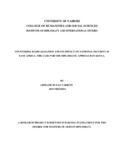| dc.contributor.author | Yarrow, Abdiaziz B | |
| dc.date.accessioned | 2016-12-22T13:03:27Z | |
| dc.date.available | 2016-12-22T13:03:27Z | |
| dc.date.issued | 2016-10 | |
| dc.identifier.uri | http://hdl.handle.net/11295/98336 | |
| dc.description.abstract | This study sought to analyze and examine the countering of radicalization and its impact on national security in East Africa. More specifically, the study analyzes the case for the diplomatic approach to countering radicalization in Kenya with a view to assessing the socio-economic and political impacts. The significance of the study is that, the study explores key thematic questions in regard to the impact of the application of the diplomatic approach to countering radicalization thus leading to knowledge driven policies on countering radicalization.
The study employed Barry Buzan’s securitization theory which primarily views securitization as the process through which non-politicized issues i.e., issues which are not talked about or politicized issues that are publicly debated are elevated to security issues that need to be dealt with urgency with choices of strategies for securitization.
In terms of methodology, the study adopted a case study research design with a focus on Kenya upon which generalizations will be made. Data was collected using both qualitative and quantitative methods with a view to enriching the findings of the study.
The study established that Kenya’s efforts to countering terrorism have led to loss of life and property and threatens the dignity and security of human beings. These diplomatic efforts also affect fundamental rights like right to life, right to liberty and right to be free and can lead to arrest of innocent people during pursuit of terrorists.
If the Kenya State is genuinely committed to protecting citizens from the threat of terrorism, then the Kenya State has a clear duty to demonstrate realistically the extent of the threat and how citizens can guard against it by giving the diplomatic approach a chance which is evident in the extent to which the strategy has been applied.
The study recommends that Kenya foreign policy strategists in the pursuit of diplomatic efforts to countering terrorism in Kenya must calculate the political, economic and security costs of certain policy positions especially given the religious and cultural heterogeneity of the country. The final foreign policy decisions must be in line with the most favorable long-term interests of the country diplomacy notwithstanding. | en_US |
| dc.language.iso | en | en_US |
| dc.publisher | University of Nairobi | en_US |
| dc.rights | Attribution-NonCommercial-NoDerivs 3.0 United States | * |
| dc.rights.uri | http://creativecommons.org/licenses/by-nc-nd/3.0/us/ | * |
| dc.subject | Countering Radicalization And Its Impact On National Security In East Africa | en_US |
| dc.title | Countering Radicalization And Its Impact On National Security In East Africa: The Case For The Diplomatic Approach In Kenya | en_US |
| dc.type | Thesis | en_US |



